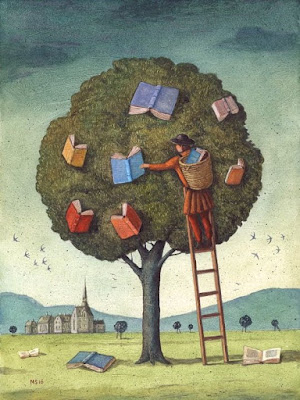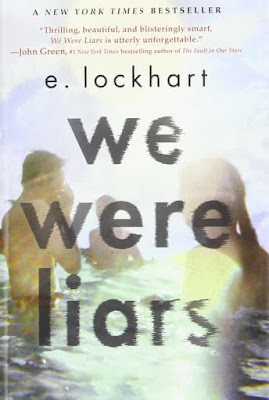Back when I was putting together my
Classics Club list, I knew that I wanted to include several books from the Victorian era. It's one of the literary time periods that I really enjoy, so after selecting several novels that I already owned for the challenge, I did a quick Google search to see if there were any notable authors that I was missing. The name that came up the most often that I didn't recognize was Anthony Trollope. I investigated a little bit further and learned that Trollope was a prolific author during his time and was probably the most well known for his
Chronicles of Barsetshire, a collection of six novels set in the fictional county of Barsetshire, England. The first novel in the series, and his first major success as an author, was
The Warden. Interested to try this new-to-me author, I put
The Warden on my list and picked up a copy at my favorite used book store. As the novel is fairly short (only 284 pages in my edition), and as I knew that my reading time was about to be reduced by school back starting up, I decided that this month was the perfect time to give it a try.
The plot of the novel follows Septimus Harding, a clergyman in Barsetshire whose affable nature has made him a favorite of the community. His main duty is to serve as the warden of Hiram's Hospital, a small almshouse that provides medical care and living accommodations to old, infirm, and penniless men. The charity hospital was established in 1434 by John Hiram, who created the foundation in his will. He left land and money to the church for the maintenance of the hospital, and since that time, his bequest has greatly increased in value. In fact, the land now produces much more income than the almshouse needs. The excess funds have been used to increase the salary of the warden, and over the years, the position has become extremely well-paying. By the time Septimus accepted the position, the salary had ballooned to 800 pounds a year, plus a spacious home to live in on the hospital property. The money and benefits of the position, however, are not something that Mr. Harding thinks a lot about. He tacitly accepted the position and its salary when it was offered to him and has been performing his duties admirably for several years.
His quiet, happy life is thrown into disarray, however, when a few other churches in the area are implicated in financial scandals. Local reformers begin looking for more examples of financial mismanagement in Barsetshire's religious institutions, and the large salary paid to the warden of Hiram's Hospital catches their attention. A young man named John Bold takes up the case and leads the charge against the inflated salary, claiming that the excess funds generated by the land should go to the hospital's patients, rather than be used to line a clergyman's pockets. Bold avoids attacking Mr. Harding directly, as his relationship to him is complicated. He has known and respected Harding since he was a child and is actually in love with his daughter, Eleanor. Even so, he feels compelled to correct what he feels is a grave, moral wrong, and he moves forward with his advocacy on behalf of Barsetshire's citizens.
Mr. Harding is devastated by this turn of events. He is distressed at the idea of people believing him to be a thief, and as newspapers begin to pick up the story and paint him in a negative light, he is depressed and humiliated. To make matters worse, he begins to doubt the fairness of his salary himself. He never stopped to consider if his 800 pounds a year was excessive before, and now that he is forced to think about it, he starts to think that maybe Mr. Bold has a point. Determined to do the right thing, Mr. Harding must decide how to move forward. Should he sit back and allow the church to crush the call for reforms with legal maneuvering, or should he give up being the warden of Hiram Hospital and put his conscience at ease?
I'm going to be honest. I struggled with The Warden. I'm not really sure why, because there isn't anything obviously wrong with it. It's the kind of classic that I should love, but I found myself consistently bored with it. It wasn't even 300 pages, which is amazingly short for a Victorian novel, and I took ages to finish it. Part of the problem was that this book had the effect of a powerful sleeping pill on me. I started nodding off almost every single time I picked it up. No matter how strongly I resolved to sit and make my way through it, I ended up disengaged within a few pages. I think the issue was that the story was about so little besides the warden's salary. Every page featured someone agonizing about it. Mr. Harding was always in a state of moral crisis over it, John Bold was always torn between duty and friendship over it, and various other supporting characters were always either upset or pleased over it. The plot was laser-focused on the moral questions surrounding this single issue and it didn't make for thrilling reading.
That's not to say that Trollope didn't make good points or paint a pretty picture with this story. His exploration of church hypocrisy and reformers raised interesting questions and his writing had a cheeky quality that frequently made me smile. Mr. Harding was a very sympathetic character and his firm sense of right and wrong was quite endearing. The relationships between the characters were complex, with lots of conflicting feelings to humanize them and add complications to the plot. I even appreciated the ending, which was a little darker than I was expecting. There were lots of things to like here. I just didn't particularly love any of it.
One more small, but frustrating difficulty I encountered was with terminology. Trollope used a lot of words that I was not familiar with in relation to the hospital and the church. I could figure most things out using context, but there was an usual amount of language that I was not familiar with throughout the novel. The fault for this frustration is mine, of course, but it did not help improve my reading experience.
So obviously, The Warden is not destined to go down as one of my favorite classics. I'm not ready to give up on Anthony Trollope though. I feel like I haven't read the best of his work yet, and I definitely want to try a few more of his novels in the future. For now though, it's enough that I tried a new author and crossed another title off my Classics Club list.
Challenge TallyClassics Club (#54 on my list): 77/100 books completed
Total Books Read in 2020: 68














